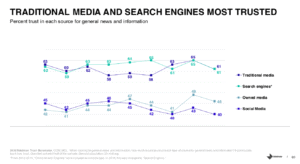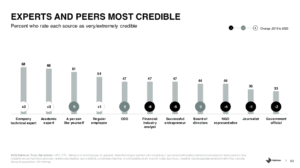
Are you using the best spokesperson for media interviews?
Doing news media interviews can be a great way to get your message heard. While overall trust in the news media has fallen, it still ranks above social media and owned media. You gain audience reach and third-party credibility from published articles that helps improve awareness and preference for your brand.

But doing media interviews does not ensure the resulting articles will tell your story in a clear, compelling way. One of the most important things you can do to get your message heard is to choose and prepare your best spokespersons.
How to choose the best spokesperson for media interviews?
Always keep the end result – getting your company’s story heard – in mind.
That means you may need different spokespersons to cover different topics and different types of media interviews.
For the best chance of getting your story heard, choose a spokesperson who is:
- Knowledgeable about the topic of the interview. The best spokesperson will be well-versed in the topic of the interview, ready to explain that topic clearly to people who may know nothing about it. Explaining things simply is particularly critical if your company makes science- or technology-related products.
- A clear, concise communicator. Knowledgeable spokespersons who ramble or don’t enunciate have a much lower chance of getting your story out. I once had a client who kept talking long after he’d clearly answered the reporter’s question. Luckily it was a phone interview, so I reached across the table and muted the speakerphone. If you must use a spokesperson who rambles, pair them with a handler who will keep the media interview on track.
- Able to stay on message. When you arrange a media interview with a reporter, you agree on a topic for the interview, one which your company is well-positioned to speak to. If your spokesperson strays off topic, you risk not getting your story heard.
- Reporters have feelings, and they appreciate friendly, personable spokespeople. If you have a knowledgeable spokesperson who is gruff or condescending, find someone else. Don’t risk damaging your brand’s reputation by using a spokesperson who may rub a reporter the wrong way. One of my clients had to stop using an extremely knowledgeable spokesperson because he had a habit of saying, “That’s a stupid question.”

What if the right spokesperson isn’t the best spokesperson for media interviews?
I get this question from clients frequently. Often, particularly in organizations with complicated technology, the most knowledgeable person is not the right person for a media interview.
There are a couple of ways to tackle this challenge:
- Consider pairing the spokesperson who has the knowledge needed for the media interview with an experienced communicator. This often works well, as the two can play off each other, and the experienced communicator can rephrase complicated messages to increase your chances of getting them published.
- Invest in training your knowledgeable spokespeople to help them tell your company’s story in a clear, compelling, concise way during a media interview.
What if your best spokesperson won’t participate in media interviews?
When your best spokesperson refuses to do a media interview, try find out why.
If it’s because they don’t think it’s important or claim they don’t have the time, remind them of the benefits to the company of participating in a media interview.
If it’s because they are nervous or feel unprepared, take the time to help them prepare. Preparation will do a lot to calm nerves before a media interview.
How to prepare? Work with your spokesperson to create a one-page Message Map on the media interview topic. With your key messages on one page, your spokesperson will see what to say and deliver your story in a clear, compelling way.
If your spokesperson is still nervous, point them to some breathing techniques to help reduce their anxiety.
Never force a spokesperson to participate in a media interview. When someone is adamant or upset, it will show in the media interviewand you risk not getting your message heard.
Does job title matter?
Sometimes a reporter will ask to interview a certain person at your organization, such as the CEO or head of a specific department. If the requested person isn’t the best spokesperson for the media interview topic, suggest the person who is. Most reporters want to interview the best person for the article and will accept the suggested change.
If the reporter pushes back, try to find out why they are insisting on a specific person. Once you have more information, you can make the best decision for your organization.
Choosing the right spokesperson to participate in a media interview increases your chances of getting your company’s story heard. A spokesperson who is knowledgeable about the topic and a clear communicator has the best chance of getting your message across.
Want to equip your spokespeople with the tools they need to succeed in media interviews? We can help. Email us today.
For more tips on communications and marketing, subscribe to our weekly blog.
Related Posts
Presenting? Help your audience with visual aids
Why do I continue to attend presentations where the speaker uses poor visual aids or bores the audience with “death by PowerPoint?” There is...
Top 100 Question: How to get your organization engaged in content marketing?
How to get your organization engaged in content marketing? Why isn’t it easier to get your whole marketing team aboard with content marketing? Many...
Marketers: Does your audience feel seen, known, and understood?
In my last blog, I shared success stories from marketing colleagues that we can all learn from as we head into 2023. And today,...
One Company. Many Stakeholders. How Many Messages?
One thing companies need but don’t always have is a single source of truth. Marketing becomes far more effective when there’s one main story...





